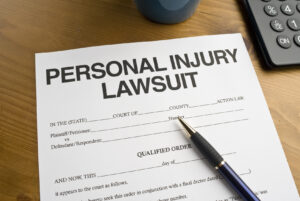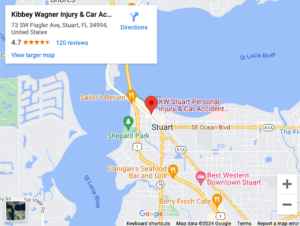
When you’re hurt because of someone else’s mistake, it can turn your life upside down. You might be dealing with pain, unable to work, and worried about your bills. In such tough times, knowing your legal rights is crucial.
In Florida, if you’re injured due to another person’s negligence, you have the right to ask for compensation. This means you can take legal action against the person or company responsible for your injury. But here’s something very important to remember: you can’t wait too long to start this process.
What Is a Statute of Limitations in Personal Injury Cases?

Whether it’s a slip and fall in a grocery store, a car accident on the busy streets, or a bite from the neighbor’s dog, there’s one key thing they all share: the statute of limitations. This might sound like a complicated term, but it’s actually a simple idea with big consequences.
In Florida, just like in many other places, there’s a rule about how long you have to start a lawsuit if you’ve been injured because of someone else. This rule is the “statute of limitations.” It sets a deadline for when you can take legal action against the person or company that caused your injury.
Here are some things that can affect how long you have in Florida to file a lawsuit:
- The type of injury: Different injuries have different time limits. For example, the time limit for a car accident might be different from a medical malpractice case.
- Who’s involved: The time limit can change depending on whether you’re suing a private individual, a company, or maybe even a government entity.
- The age of the victim: If the person who got hurt is a child, the rules can be different.
One crucial point to remember is that if you miss this deadline, you might lose your chance to sue forever.
How Long Do You Have to File a Personal Injury Claim in Florida?
In Florida, if you’re hurt because of someone else’s mistake, you usually have two years to ask for compensation through a lawsuit.
The following are common situations where the two year statute of limitations applies:
- Auto accidents: Car crashes are sadly a common cause of injuries. If a driver’s mistake leads to an accident, you have two years to start a lawsuit. This same rule applies to accidents involving motorcycles and trucks.
- Slips, trips, and falls on someone’s property (premises liability): If you get hurt on someone else’s property because it wasn’t safe, like poor lighting or fire hazards, the property owner might be responsible. You have two years to file a claim for injuries in these cases.
- Wrongful death: If someone’s mistake leads to death, the estate’s representative can sue for compensation. These lawsuits need to be started within two years of the death.
- Medical mistakes (medical malpractice): Sometimes, doctors or hospitals make serious mistakes. If you’re injured because of a medical error, you have two years to sue. But if you don’t realize you’re hurt right away, like if a surgeon leaves something inside you by accident, the two-year clock starts when you discover the injury.
Remember, missing this two-year deadline can mean losing your chance to get compensation. Starting the process as soon as possible is often the best approach.
Suing the Government for Personal Injury: Shorter Deadlines to Watch Out For
Sometimes, an injury might involve a local, state, or federal government agency. If that’s the case, the rules are a bit different – and usually stricter. When you’re planning to sue the government in Florida for a personal injury, the time you have to act can be much shorter than usual.
Here’s what you need to know:
- Shorter statute of limitations: Instead of the typical 2-year limit, you might have only six months to file your lawsuit. That means you need to move quickly to make sure you don’t miss your chance.
- Administrative steps first: Often, you can’t just go straight to court. First, you might need to go through some steps with the government agency involved. This is called “exhausting administrative remedies.” For some claims, this process needs to start within the first 30 days after your injury.
This part is really important because if you skip these steps or wait too long, you could lose your right to sue the government. It’s a different process than suing a private person or company, so it’s a good idea to talk to a lawyer who knows about these kinds of cases.
When Does the Clock Start on Florida’s Statute of Limitations?
Understanding when the clock starts ticking for the statute of limitations in Florida is crucial. Usually, this clock starts on the date you get injured. But, there are some special situations where it’s not that straightforward.
Sometimes, you might not know right away that you’re hurt. This happens often in medical malpractice cases, like if a doctor’s mistake isn’t clear until later. In these cases, Florida courts may decide the clock starts when you find out about your injury, not when it actually happened.
Pausing the Clock (Tolling): There are times when the statute of limitations can be “tolled” or paused.
The statute of limitations may be tolled in the following situations that are out of your control:
- The person you want to sue leaves Florida
- A natural disaster like a hurricane shuts down government offices
- You’re temporarily unable to handle legal matters because of a health issue
- You were a minor (under 18) when the injury occurred
These exceptions are important because they can give you more time to file a lawsuit. However, these situations can be complex, and the rules can vary depending on the details of your case.
Contact an Experienced Personal Injury Attorney in Stuart, FL
It’s crucial to talk to an attorney as soon as you think you might have a case. Our Stuart personal injury attorney can help you understand your case’s specific time limits, ensuring you don’t miss your chance to seek compensation.
Contact our lawyers today at KW Stuart Personal Injury & Car Accident Lawyers. You can call us at (772) 444-7000 for a free consultation and to learn more about the statute of limitations for your case.

